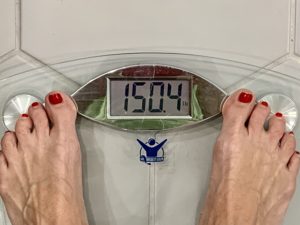I had a really interesting conversation with @JayLynnJacobs on his Facebook Live show Going Beyond the Scale yesterday, and one of the things we touched on was the concept of body positivity. As fat shaming continues to be one of the last socially acceptable forms of discrimination, a movement toward acceptance of any body at any size — “body positivity” — has grown over the past few decades. The “fat acceptance” movement is quite similar, but focuses specifically on people with overweight or obesity. Many proponents of these movements express the viewpoint that weight loss efforts are harmful and that if you love yourself as you are, you cannot simultaneously want to lose weight. As if the desire to lose weight can only come from self-hate. I couldn’t disagree more.
I personally believe that each human being on this planet IS wholly valuable and acceptable and lovable as they are. And the desire to lose weight (and by that I mean wanting to lose body fat – because no one really ever wants to lose muscle, do they?) can come from many different thoughts. One person can hate their body and wish they were thinner because they think that may make them more accepted by society, and thus be driven to lose weight in order to feel more lovable. This is coming out of shame. Another person can have a completely different take – they can love themselves and feel comfortable with who they are, but want to lose weight simply in order to improve their health, to improve their mobility or exercise tolerance. And that weight loss desire comes out of self LOVE, not out of self hate.
There are people who argue that many overweight people are healthy, and therefore have no reason to lose weight. I think that mostly this is referring to the basic medical measurements of blood pressure, lipid profiles, and blood glucose measurements. Indeed, many overweight people have great numbers. But I can tell you from personal experience that weight loss from overweight to a “normal” BMI of <25 can improve those numbers even more. For most of my life I lived with a borderline blood pressure of the 130s/80s. This was never really considered hypertensive, and I was never prescribed blood pressure medicine. My hemoglobin A1c during the year after Graham was born when I was still nursing and weighed upwards of 200 pounds was 5.4% (with prediabetes starting at 5.7% and full flown type 2 diabetes starting at 6.5%). So my blood pressure and blood sugar would’ve been called “normal,” but were they optimal?
Since losing about 50 pounds over the past 3 years, my blood pressure is now literally ranging from 95/59 to a high of 117/77. I’ve never seen such low personal BP numbers in my life. The SPRINT clinical trial published in the New England Journal of Medicine, which compared the benefit of treatment of systolic blood pressure to a target of less than 120 with treatment to a target of less than 140, found a decrease in overall death when blood pressure was below 120. Similarly, mid-life hypertension is a risk factor for cognitive decline and dementia later in life (my own area of interest, as you know). My systolic blood pressure didn’t go below 120 until my BMI was close to or below 25. I have first degree relatives with whom I share 50% of my genes who are significantly heavier than I am and who have hypertension and type 2 diabetes. I myself was found to have prediabetes when I was cast as a contestant on season 3 of The Biggest Loser (at a weight of 270 pounds and a BMI in the morbidly obese range at 43.6). Today, my hemoglobin A1c is 4.9% — well within the normal range. Even after I binged on cookies and cakes for 3 months over the 2020 holidays/into January and gained 15 pounds, my hemoglobin A1c was still just 5.1% (with my weight being 160 and my BMI being 26 at the time). I have beautiful blood pressure and blood sugar numbers, and my good cholesterol is higher than my bad cholesterol, while others sharing my DNA who are significantly heavier than me have full blown diabetes, hypertension, and hyperlipidemia requiring drug therapy. I do not believe this is a coincidence — I believe that my lower body fat percentage is preventing those diseases in me despite my genetic predisposition toward them.
My father died last June at the young age of 70, ultimately related to complications of morbid obesity. He had severe spinal stenosis/arthritis (a condition made significantly worse with weight on the spine) with chronic pain and had surgery on his back, which led to osteomyelitis (infection in the bone) and chronic antibiotics as well as significant immobility. He fell several times at home trying to ambulate using a walker that he wasn’t used to and ended up fracturing his lower spine and developing cord compression and paraplegia (paralysis from the waist down) at the age of 69. Because he was so heavy, he was unable to use his upper body strength to move himself out of bed into a chair, and was therefore completely bedridden and required a special lift to help transfer him from bed to wheelchair. He developed several urinary tract infections (UTIs) because his bladder function no longer worked properly due to the spinal cord compression, and he ultimately passed away within a few months of developing the paraplegia with sepsis due to a UTI. I have no doubt that were he lighter and more mobile, none of this would ever have happened to him.
So whether or not someone has diabetes or high cholesterol, there are other adverse effects that extra weight has on the body (such as wear and tear on the joints and spine which lead to premature disability). I feel strongly that achieving as close to a normal body fat percentage as possible has many health benefits and can help stave off physical disability as well as cognitive disability, not to mention decrease the risk of mortality. Does this mean that if my body is 50 pounds overweight, that I should hate myself, or accept anyone else shaming me for my size? HELL NO. I was 50 pounds overweight just 3 years ago, when my photo was published in the New York Times as an expert on weight maintenance. (I was still more than 100 pounds lighter than my highest weight of 300, so this truly still was “weight loss maintenance” even as I weighed close to 200 pounds!) I was not ashamed of my size then, but losing even more body fat has dramatically improved my health, and I strive to achieve the healthiest body and brain that I can — because I love myself. Not because I am ashamed or because I am trying to conform to society’s idea of what beauty is. Because I want to have the best quality of life I can. Because I want to be around as long as possible for my 4 year old son, Graham. Because, like my dad, I have spinal stenosis and degenerative disc disease and I want to remain as mobile as I can for as long as I can. Because I want to preserve my mind and stave off Alzheimer’s disease. This is the ultimate in self love. I never judge anyone for their size, just as I never want to be judged for mine. But I am here to help anyone who wants to love themselves to a healthier weight.
With love,
Jen
PS – here’s my Project 135 update: my weight today was down 0.6 pounds from 2 weeks ago, at 150.4. I’ll take it!
Project 135 stats:
Starting weight: 159.6 (May 2020)
Week 1: 157.2
Week 2: 155.6
Week 3: 155.4
Week 4: 153.8
Week 8: 150.8
Week 12: 150.8
Week 17: 155.2 (after sugar binges)
Week 19: 153.8
Week 25: 146.6
Week 26: 148.2 (after Halloween candy)
Week 28: 146.6
Week 29: 148.8 (after Thanksgiving)
Week 30: 148.4
Week 31: 149.0
Week 32: 152.2
Week 33: 153.0 (after Christmas)
Week 37: 153.8 (January 2021: Started intuitive eating experiment)
Week 38.5: 160.8 (on Feb 1, 2021 -> the experiment failed! Go back to NSNF)
Week 40: 156.4
Week 42: 151.6
Week 44: 153.0
Week 45: 154.4
Week 46: 152.4
Week 48: 151.0
Week 50: 151.0
Week 52: 150.4
Total weight loss: 9.2 pounds (5.8%)

